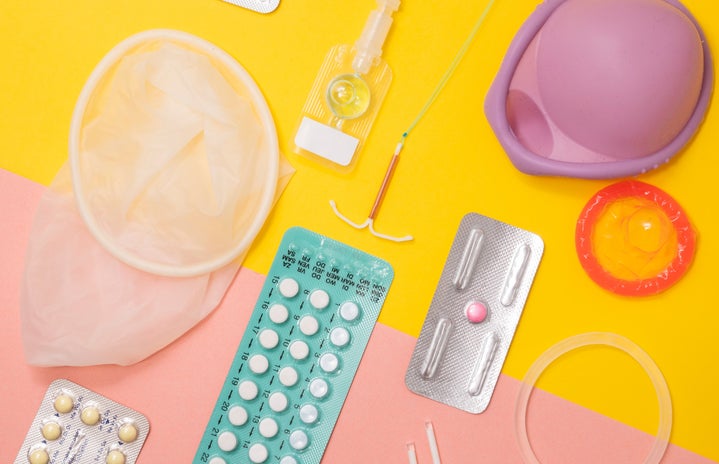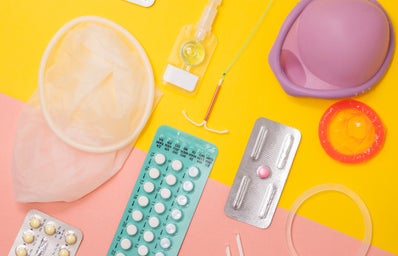Saying hello to Mother Nature
From the day that I got my first period, I had been told that I would be given a choice when it came down to my body. “You’re a woman now,” my mother told me, as she handed me a pad from the Kotex box under the bathroom sink. As a woman, it was important to know that my rights for my own reproductive freedom had fallen into my own hands, just as they should. The first day was filled with awkwardness as I learned about menstrual hygiene and upkeep. By the end of the day upon changing my underwear a few times, I finally got the hang of what this new phase of puberty would bring me.
It wasn’t until a few months later that my period was regulated. An average cycle runs about 28 days, from the first day of your last period, to the beginning of the next one. Just like my mother had for years before me, I would wake from my sleep at the young age of 14, in pain with agonizing cramps so bad that I couldn’t stop crying for hours. After experiencing this, I realized that relishing in my newfound femininity was not as glorious as I had hoped.
“Just suck it up,” my friends would say; it was often the friends who experienced shorter PMS cycles with minimal to no cramping or other side effects. For two years I dealt with a vicious cycle, one I could only begin to describe as stabbing pain in my uterus for hours on end. No drug could fix the way I felt every month, and although it only happened once a month, I was getting fed up.
When I was 16, I talked to my doctor in order to find a better alternative for dealing with my period. This was the first time I heard about the birth control pill. I still remember being told that it would help with my acne, period cramps, and act as a contraceptive when it comes to being sexually active, which sounded appealing in every way, especially since I started having sex at that age. As a curious teen, I stuck to what I knew for a long time, primarily using condoms; I had never thought about the possibilities of other forms of contraception.
Sign me up!
The birth control pill is orally ingested, and is proven to be 99.9 per cent effective. The pill is to be taken at the same time every day and can be offered in three different forms: 28 packs are typically the most common, with the case containing 21 active pills and 7 inactive pills. The inactive pills are sugar pills that start and finish during the time of your predicted cycle. 21-day packs contain 21 active pills. For the seven days of your period, you don’t take any pills. The third option is a 91-day pack, which is often considered by those with heavy and painful menstrual cycles, where they would only get their period every three months [or 12 weeks]. When considering which option to take, make sure you choose the one that’s right for you and the one that leaves you feeling the most comfortable about what’s going into your body.
Birth control pills are little capsules of hormones, specifically a combination of estrogen and progestin, which work together to prevent ovulation. According to an article by certified sex educator, Emma McGowan, sexually active individuals should be tested for STIs at least yearly, but more specifically after each individual sexual partner.
Taking all this into account, I decided to try birth control. First I was prescribed a 28-day pack of Alesse, which worked for two years. In the summer of 2018, I could no longer control my period. I thought it was a fluke at first. Eventually, I also lost all desire to have sex and became moody. Although my cramps had improved significantly, I decided the side effects weren’t worth it. In the winter of 2018, I got off the pill and have yet to try it again out of fear.
Female voices speak out on birth control
“Just go on birth control, I’m tired of wearing condoms,” or “Stop being a big baby, your cramps can’t even be that bad,” are phrases that I had heard while contemplating the pill, and I can assure you I’m not alone. There is a huge stigma around safe sex, using contraception and the different methods of contraception, especially in high school and university.
Second-year journalism student at Ryerson University, Maria McCollum, took the pill while attending a Catholic high school. “My cramps have always been bad. Having begun to take Alysena 28 at the age of 15, I remember being taught that contraception of any kind was wrong even for medicinal purposes,” she says. “I don’t believe anyone should have the right to tell a young girl what to do in regards to their body. Since then I’ve felt guilty taking it even though I know it’s what I need to do.”
The intimate relationship between a girl and her body has left many teens uneasy with their decision to start birth control. Between the fear of acceptance among their boyfriends or parents, they’re left with a difficult decision.
Laurier University alumni Lauren Bishop thanks her mom for letting her start birth control at an early age. “I started birth control probably halfway through Grade 12,” she says. “I went on it because I had started to have sex more often, and after having to take Plan B once, I didn’t want to have to only rely on emergency methods.”
Bishop was originally prescribed a “mini pill,” meaning one that contained no estrogen. “This was because my mom had a stroke a few years ago and she was concerned about the estrogen potentially causing complications to my health,” she says. “Luckily for me I had no problems and my mom was super understanding even when I switched birth control later on.”
Although some women have trouble finding birth control that works for them or coming to terms with the idea of taking it, others find birth control extremely important and essential in their everyday lives.
Second-year journalism student and fellow Her Campus Ryerson writer Mercedes Gaztambide got an IUD when she was 17. “I switched birth control pills three times after experiencing major spotting, mood swings, and bad acne,” she says. “Mostly though, I struggled to take it consistently. I felt awkward popping out my pill box at lunch time and honestly, I often forget. I was also becoming sexually active and I was sick of spending money on condoms and constantly fearing pregnancy.”
After struggling with her pills, she made the switch, “It was the most painful experience of my life but now it’s been almost three years since I’ve had the IUD and it was undoubtedly the best decision I’ve made for my sexual health since buying a vibrator,” she says. “It’s given me sexual freedom and liberation in ways that no other birth control could give me and despite the excruciating pain, I would get it again.”
High school student Jacklyn Roberts says there are pros and cons to taking the pill. “I’ve been on Alesse 28 for a year due to severe cramps. I was super nervous to start it because of all the bad stories I heard from others but thankfully it turned out to be the right birth control for me,” she says. “I did notice an increase in appetite, as well as moodiness. I was super irritable, and still am, but you learn to control it.”
However, since the pill is a hormone, Roberts expected the side effects, “I also have had a decrease in cramps and lighter periods too. The only downside is I gained some weight but nothing noticeable; five pounds at the most,” she says. “I’m always protected, which gives me peace of mind for sure. Birth control has honestly made my life easier as I have way less anxiety over pregnancy and I’m able to actually function on my period which I was unable to before.”
Be safe, be smart, be yourself
Birth control is a discussion that is not meant to be taken lightly. All things considered, it is important to do what you feel is best for yourself. Using methods of contraceptives as you see fit is a given but you should ultimately decide to take birth control on your own time and if/when you feel most comfortable. No boy should be able to dictate if you should begin taking it, nor should your friends or family members. The body you’re living in doesn’t belong to anyone but yourself.
Practice safe sex in order to reduce uncomfortable side effects or unhealthy outcomes.
HIV HOTLINE: 1-800-332-2437


